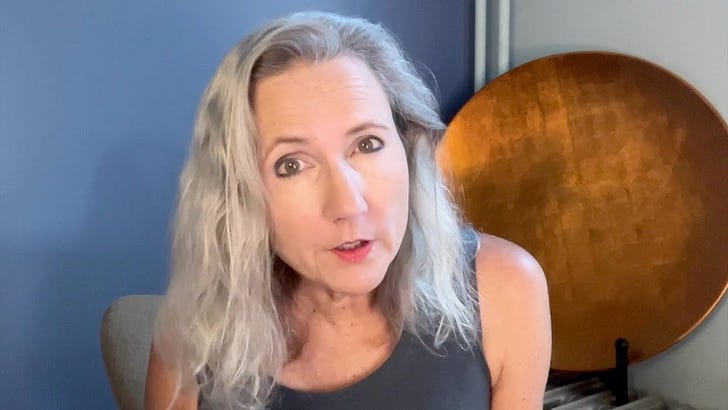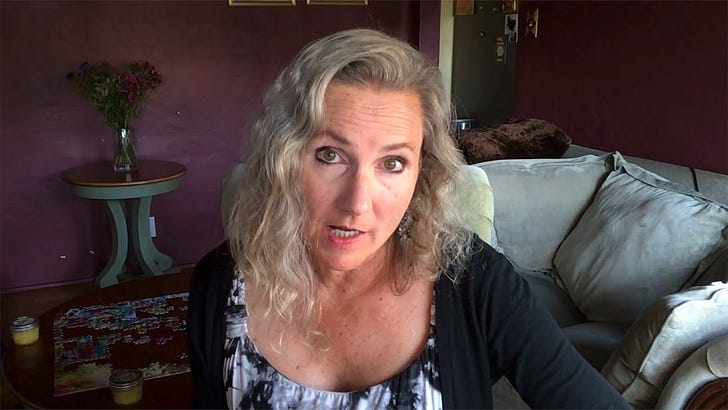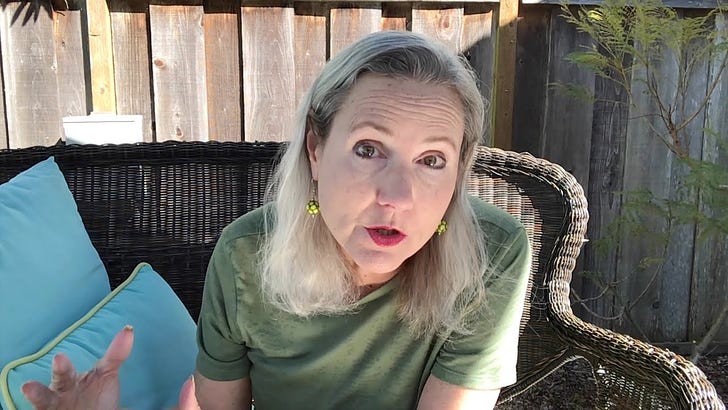In a long comment thread with Guy Duperreault on The Question of Evil, he mentioned that he’d just watched the 4-hour interview of Anneke Lucas by Brecht Arnaert on Epoch. I have it embedded at the end of this essay.
Anneke is the author of Quest for Love, Memoir of a Child Sex Slave. She was the victim of a pedo-sadist cult, where she was brought on weekends by her mother, a victim of abuse herself who abused Anneke as an infant. Anneke calls it ‘the network’ and it involves high profile people, some of whom she knows by name. By her estimate, she was raped over 2000 times before she was 14, by over 200 different men by her count.
I was very impressed by Anneke. She feels completely genuine to me. And her spiritual revelations and psychological insights, as a child being raped and tortured, are astounding. But Whitney Webb’s One Nation Under Blackmail has also prepared me to believe Anneke. Whitney focuses on the global web of political and financial corruption, and not the pedophilia from the child’s perspective. But the two are inseparable and Anneke supplies the missing link.
I am more skeptical of Brecht and his theories. Clearly he has an agenda, with the religious statues in the background and the praying ahead of time. To him, it's good vs. evil, Jesus vs. Satan, Judeo-Christianity vs. Canaanites worshipping Moloch. So far, I haven't found a single Canaanite mentioned in Whitney Webb but there's not a page that doesn't name a Semite—who the Torah identifies as the masters with the Canaanites as their slaves.
psychology of sadism
Anneke states that psychopathy comes from the fear that you are unlovable, not the light, not the innocent child. You then seek the substitute for love: release from fear through violence. When you come into the world, she says, you have spirit and that’s reflected by the people who love you. When it’s not reflected back, and no one recognizes your innocence, you think that something’s wrong with you, you’re bad, and don’t see that it’s their limitation.
In the brutal mind-control training inflicted on Anneke, she was conditioned to see what men wanted, their secret perversion and weakness. Her spiritual insight was that these were the same abuses they had experienced as children. When they reversed the roles and became the perpetrator, it gave them the ‘high’ of being in power over their trauma by passing it on.
trauma-based sadism or power-based satanism?
Anneke’s statement, as I understood it, was that the ‘Satanic ritual’ was an excuse for these men to project the helplessness they had felt as terrorized children, and get 'high' from being the one now in control. It’s cathartic exhibitionism because they’re doing in public, for an approving and complicit public, what what done to them in private. She doesn't believe there's supernatural power in it, although she did see transformations (contortions?) that seemed impossible.
These are horrific rituals, during which one child is killed or tortured to death while another child is gang-raped. When we describe them as Satanic, I think we encourage them as a source of power and strength. We are reinforcing the belief of the perpetrators that they’ve sold their souls to the devil and have only hell to live for, so now is the time for thrills and kills. They believe getting away with what they’re doing financially depends on these acts of cult violence and the secrecy around them.
I keep coming back to the question of 'what difference does it make?' or 'is it useful?' If a person believes themselves to have been born evil, a monster, a predator, who no one will ever love but all will fear, what do they do? They live to make people afraid of them and inflict as much terror and pain as possible. Why would they change? They're already condemned and might as well make the most of it.
Now let's say that someone who abused Anneke was reaching the end of his life—as many of them must be. He reads her story of forgiveness and understanding. He decides that all isn't lost and maybe there are people who would see him in his whole context. He comes forward with details of what he's done, what others have done, what made him vulnerable to it, how he was manipulated—not as an excuse but to expose and make the amends he can. It wouldn’t be as satisfying as revenge but if the objective is to end the behavior so it can never happen again, it might make a difference.
toxic power as pyramid
At one point Anneke says, “The whole toxic power exploitation paradigm is trauma-based.” She sees the shape of toxic power as the pyramid, with each layer exploiting those below it. Trauma is what holds the pyramid together.
condemnation is domination
Brecht says of the one called ‘the Monster’, “I would have killed him. Kicked him in the balls.” And Anneke says, “You don’t know what you would have done. You’re a child, you’re powerless.” His assertion that he wouldn’t have succumbed, wouldn’t have been a victim, seems demeaning. It says, “That could never have been me.”
Anneke is trained to kill, starting with rabbits. At one point, she’s told to choose a puppy, which she thinks is a reward. She chooses the quietest one and is told she made a good choice. After two days, she’s given a knife and told to kill it. She refuses and the puppy is tortured, and everything done to it is her fault, until she finally kills it out of mercy. After that, she says, every killing is a mercy killing.
In response Brecht says, “I think you made the best choice in that situation.” Anneke says, “There was no choice. There was never a choice.”
Brecht comments, “When you believe you are superior, you can do anything.” Yet everything he says show his belief in his superiority. The more that he condemns the perpetrators, the more he’s ‘good.’ By his moral superiority, he’s inverted the pyramid and formed a new one, based on virtue. But it’s still a form of toxic domination and power. He’s now the one on top, wielding the knife of righteous indignation.
the recurrent dream
I’d like to tie this into A Course in Miracles. Before Helen Schucman started transcribing the voice she heard into 1300+ pages of text, she had a recurrent dream. In it, there was always an enemy. She would fight to the death, or there would be a ritual sacrifice. Sometimes she killed and sometimes she was killed. It always ended in death until the next night, when it would happen all over again.
Like Groundhog Day, but with blood. And then in her dream, Helen heard a voice saying, “Choose again.” She understood that the decision to kill always ended with being killed. There was no enemy. The enemy was her.
spelunking into the nightmare
Brecht expresses that he finds it annoying when people imply someone ‘chose’ a hard path. Anneke states, “I needed this because I’ve learned what I never could have through this healing process. I’ve learned to open my heart. I’ve learned to understand the most evil men and even love them, if I dare say so.” Brecht starts to say, “I have learned also…” and stops, which was good because I was about to throw the computer across the room.
Anneke didn’t need to go through this awful experience for her own growth, but I believe she chose it for ours. I picture Anneke as spelunking into the deepest, darkest heart of the nightmare, so she could bring the darkness back and be the crucible to make sense of it over the next 30 years of healing. There’s something essential in her first-hand experience combined with her spiritual insight and psychoanalysis of the perpetrators.
Her ability to see the perpetrators as human and vulnerable, and even forgive them, is life-affirming and awe-inspiring. Anneke says, “It takes courage to feel the fear. Courage is already spiritual. You can’t be courageous unless you trust that something is greater than yourself and will catch you.” If she can forgive, who are we to condemn?
mind-control slaves
Anneke says that they were trained to be superhuman robotic slaves. The techniques, which are very sophisticated and complex, were used in Nazi Germany—although they originated elsewhere—and brought to the US with Operation Paperclip.
The rapes didn’t steal her innocence because as long as you’re a victim, you can be innocent. What stole her innocence was being made complicit in the killings, and the illusion of choice. In a subtler way, that seems at work in our current Covid moment. In his post, Just This is It. What is This? Pt 1, Guy Duperreault quotes Theodore Dalrymple, aka Anthony Daniels, British psychiatrist:
The purpose of propaganda is not to persuade or convince, not to inform, but to humiliate; and therefore, the less it corresponds to reality the better. When people are forced to remain silent when they are being told the most obvious lies, or even worse when they are forced to repeat the lies themselves, they lose once and for all their sense of probity. To assent to obvious lies is in some small way to become evil oneself. One's standing to resist anything is thus eroded, and even destroyed. A society of emasculated liars is easy to control.
aristocrats vs nobility
Brecht says something positive about aristocracy and Anneke practically spits, saying I’ve seen aristocracy. Brecht clarifies that he think there’s an aristocracy of virtue and Anneke says that she’d call that nobility. Yet both mean the same thing, as bloodlines believing in their genetic right to rule over all others.
At some point in her ordeal, Anneke’s blood is tested and she’s found to have whatever genetic markings make her part of the elite. After this she’s elevated to a type of goddess. She’s kept naked to show her body doesn’t belong to her, she’s merely its lucky inhabitant. She continues to be ritually raped and part of the blackmail scheme. But she’s also worshipped and shown a future of luxury and wealth.
She turns it down. And from that moment she’s made to feel worthless and stupid, that she’ll never amount to anything. And when her ‘rescuer’ intercedes to let her go, she believes that story about herself for many years.
who pulls the strings of the pedo-puppets?
Months ago, I started a draft on this topic using the Unz Review article The City of London by Larry Romonoff. The City is one square mile in the center of London with a separate jurisdiction from which all banking, finance and insurances emanate. Israel itself is a franchise of the City. As Romonoff writes:
An article in the Eurasia Review called the City of London ”A Parasites’ Paradise, Or The Best Criminal Sanctuary Money Can Buy”: “London has become the center of global financial capital by engaging in long term large scale active collaboration with multi-billion-pound drug, arms, people smuggling and sex-slave cartels. The [Khazarian Jews in the City] specialize in laundering funds from the Mexican, Colombian, Peruvian, Russian, Polish, Czech, Nigerian narco-kings. . . white slavers have their “private bankers” at prestigious City banks . . . kleptocrats, lifelong billion-dollar tax evaders, fleeing from their pillaged homeland.” It continues that “The City Boys” welcome “every gangster / oligarch”. It continued by stating, “The London Sanctuary for the world’s richest plunderers and parasites offers unprecedented services, especially protection from extradition and criminal prosecution at the site of their crimes.”
a hypothetical question
If you could end the torture, rape and enslavement of children by forgiving the perpetrators, would you do it? Forgiveness isn’t coming from a superior place, and granting an unearned mercy that further reinforces your goodness and their guilt. Forgiveness gives the benefit of the doubt forward, that I would have done the same in your circumstances. It says I’m no better than you. It says you are me in a different role in this dream, and I’m grateful I didn’t have to walk your path.
Imagine that someone could give you 100% guarantee that the abuse would end, for everyone, for ever, but only if you—like Anneke—could come with an open heart to understand the most ‘evil’ men, forgive and dare I say love them. Would you do it?
In the same vein, here is my most controversial video on Forgiving Hitler:
I examine the spiritual, psychological and geopolitical reasons to forgive Hitler, not by absolving his guilt but by questioning the WWII official narrative. As the personification of evil, is Hitler a projection of a systemic brutality that was only spurred by his defeat? I question the cause of the anger invoked and how it relates to 'triggers' of 9-11 or the CoVax. I end by looking at the hope and possibility for social change when we give all people the same integrity we give to ourselves.
and this looks at the domination power paradigm in Toxic Masculinity:
What is toxic masculinity? I give several examples from the reactions of those who usurped my term, "tonic masculinity" demonstrating that they don't have any idea.






It's a sick pyramid of control and I hope people becoming aware about it will make it shrink or disappear. 🙏
Her description of psychopathy is actually the description for narcissism, which comes from wounding like she described here.
"Anneke states that psychopathy comes from the fear that you are unlovable, not the light, not the innocent child. You then seek the substitute for love: release from fear through violence. When you come into the world, she says, you have spirit and that’s reflected by the people who love you. When it’s not reflected back, and no one recognizes your innocence, you think that something’s wrong with you, you’re bad, and don’t see that it’s their limitation."
A psychopath is not this. They basically have no affective empathy, but a lot of cognitive empathy which is the empathy calculated by following rules and expectations. They don't feel fear the same way as described above.
Here's a good video on the issue of empathy in autism vs psychopathy.
https://youtu.be/TajItoz3ftI
I'm glad to see more attention on trauma based mi d control, which I believe, along with narrative warfare, to be the true most dangerous weapons in the world.
We all have a choice to become the monster, fight the monster, or go along to get along (often "out of sight, out of mind").
One thing I discovered in my research on the Nazi cult is that Hitler had a twisted sadomasochostic sex life in which he asked women to kick or otherwise hurt him when he got naked. He may have roped his niece into this. She came to live with him at 16 or 17 and killed herself, broken, around four years later.